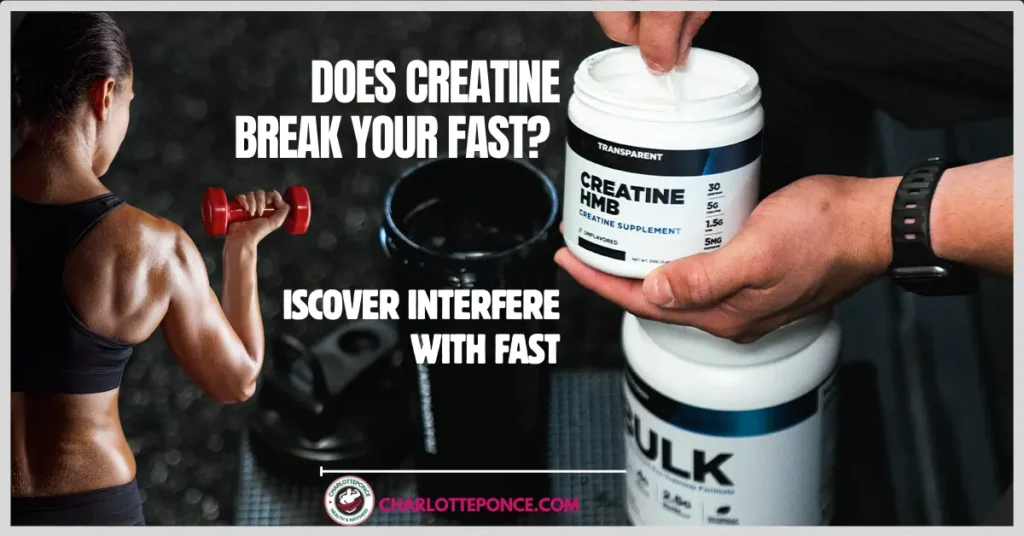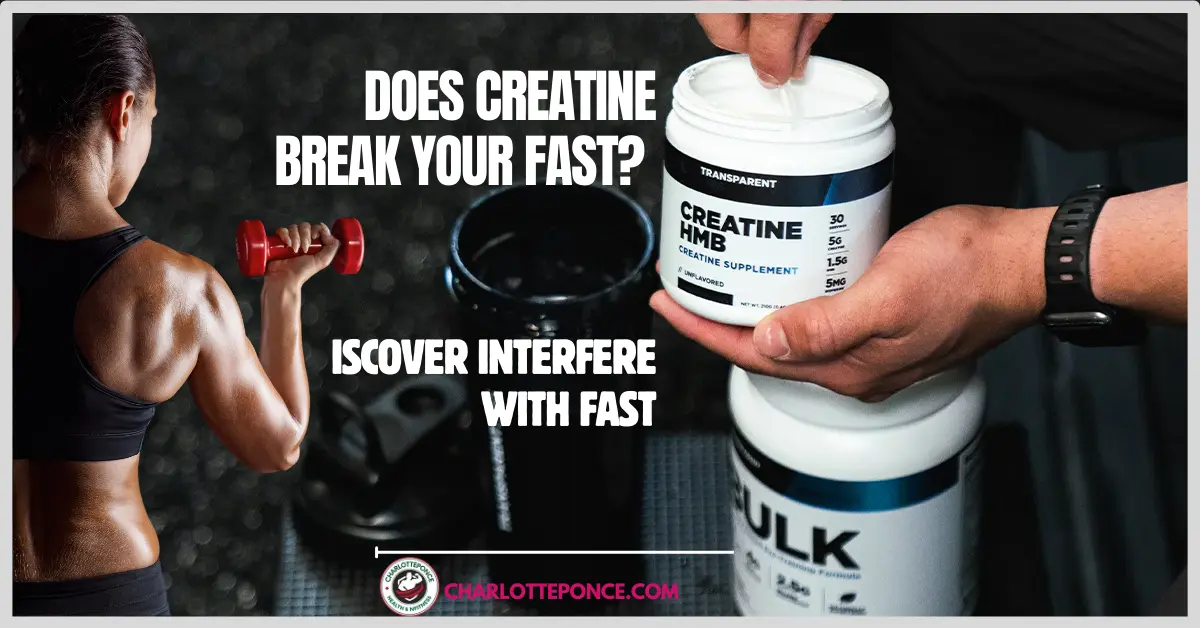Does Creatine Break Your Fast? No, creatine does not break your fast as it contains no calories and does not trigger an insulin response. Taking creatine during your fasting window is considered acceptable and can be beneficial for muscle building and performance enhancement.
When it comes to fasting, individuals often wonder if consuming creatine will disrupt their fast. The good news is that creatine does not break your fast. This popular supplement contains no calories and does not stimulate the release of insulin.
Therefore, taking creatine during your fasting window is perfectly fine and can even have benefits for muscle building and performance enhancement. We will delve into the details of creatine and fasting. We will explore why creatine is not considered to break a fast and how it can support your fitness goals while you’re not eating. So, let’s get started and find out if creatine is compatible with fasting.

Page Contents
ToggleWhat Is Creatine?
What is Creatine?
Creatine is a naturally occurring compound that plays a crucial role in the production of energy within muscle cells. It is primarily found in meat and fish, and it can also be produced in the body. Creatine is an essential component in the production of adenosine triphosphate (ATP), which is the primary source of energy for cellular and muscular function.
Role In Energy Production
Creatine plays a significant role in energy production within muscle cells. When the body requires immediate energy, such as during intense physical activity, ATP is broken down to release energy. Creatine helps to regenerate ATP, allowing for a rapid and sustained supply of energy to the muscles, thereby enhancing physical performance and endurance.
Commonly Used In Sports Nutrition
Creatine is commonly used as a dietary supplement in the field of sports nutrition. It is known to improve muscle strength, power, and exercise performance, making it a popular choice for athletes and fitness enthusiasts. Additionally, it has been studied for its potential benefits in helping with certain medical conditions, such as muscle disorders and neurodegenerative diseases.
Intermittent Fasting And Its Effects On The Body
Creatine does not break a fast as it contains no calories or triggers an insulin response. Taking creatine with food is an option, but it can also be consumed on an empty stomach. It aids in muscle building during intermittent fasting.
How Fasting Affects Metabolism
Intermittent fasting is a popular eating pattern that involves cycling between periods of fasting and eating. During the fasting phase, which can last anywhere from 10 to 16 hours or even longer, the body undergoes several metabolic changes. One of the main effects of fasting on metabolism is an increase in the production of ketone bodies. Ketones are molecules produced by the liver when the body is in a state of ketosis, which occurs during prolonged fasting or a low-carbohydrate diet.
When the body is in ketosis, it switches from using glucose as its primary source of energy to using fat.This metabolic shift can lead to increased fat burning and weight loss. Another metabolic change that occurs during fasting is a decrease in insulin levels. Insulin is a hormone that regulates blood sugar levels and promotes the storage of fat. By reducing insulin levels, fasting can help improve insulin sensitivity and promote fat breakdown.
Benefits Of Intermittent Fasting
Intermittent fasting has gained popularity for its potential health benefits. Studies have shown that it can help with weight loss, improve insulin sensitivity, and reduce inflammation in the body. One of the key benefits of intermittent fasting is its ability to promote autophagy, a process in which the body breaks down and recycles old or damaged cells. Autophagy has been shown to have anti-aging effects and may help protect against certain diseases, such as cancer and Alzheimer’s. Fasting also stimulates the production of human growth hormone (HGH), which plays a crucial role in muscle growth, fat metabolism, and overall health.
Increased levels of HGH can help improve body composition and enhance athletic performance. Additionally, intermittent fasting has been linked to improvements in brain health. It may enhance cognitive function, protect against neurodegenerative diseases, and promote the growth of new brain cells. In conclusion, intermittent fasting can have profound effects on metabolism and overall health.
It promotes ketosis, increases fat burning, and improves insulin sensitivity. Additionally, it has numerous other benefits, such as promoting autophagy, increasing HGH production, and improving brain health. So, if you’re considering incorporating fasting into your routine, it’s important to understand how it affects your body and the potential benefits it can provide.
Understanding The Impact Of Creatine On Fasting
Fasting has become a popular practice for promoting weight loss, improving metabolic health, and increasing longevity. However, one common question that arises is whether consuming creatine during a fasting period breaks the fast. In this article, we’ll delve into the topic of creatine and fasting to better understand the potential impact it may have on your fasting goals.
Does Creatine Break A Fast?
Do you think, Does Creatine Break Your Fast? When it comes to determining whether creatine breaks a fast, there are differing opinions among experts. Some argue that since creatine is a molecule that contains calories, its consumption during a fasting period technically breaks the fast. On the other hand, proponents of creatine supplementation suggest that its relatively low caloric content and minimal impact on blood sugar levels make it acceptable to use during fasting.
In general, if your primary goal during fasting is to achieve autophagy or a complete metabolic rest, it may be best to avoid taking creatine. However, if your fasting goals are focused more on improved athletic performance or muscle gain, incorporating creatine may be beneficial.
Potential Effects On Autophagy
Autophagy is a natural cellular process that occurs during fasting, and it helps to remove damaged cells, promote cellular repair, and improve overall cellular health. Some studies suggest that consuming certain nutrients, including creatine, may inhibit autophagy by activating anabolic pathways that counteract the fasting state.
Although the impact of creatine on autophagy is not yet fully understood, it is important to consider these potential effects when deciding whether to include creatine in your fasting routine. If maximizing autophagy is your primary goal, it may be wise to avoid creatine during your fasting window.
However, if you are more focused on other aspects of fasting, such as muscle preservation, improved exercise performance, or recovery, the inclusion of creatine may be beneficial. It’s important to listen to your body and assess your individual goals when making these decisions.
In conclusion, the question of whether creatine breaks a fast is still a topic of debate. While some argue that its caloric content may disrupt the fasting state, others believe that its minimal impact on blood sugar levels and potential benefits for muscle gain justify its use during fasting. Ultimately, the decision depends on your specific fasting goals and priorities.
Practical Considerations And Expert Opinions
When it comes to fasting and the use of supplements like creatine, practical considerations and opinions from nutrition and fitness experts play a crucial role in making informed decisions. Evaluating the impact of creatine on fasting requires a comprehensive understanding of its effects on the body during periods of restricted calorie intake.
Views From Nutrition And Fitness Experts
Several nutrition and fitness experts have offered insights into the use of creatine during fasting. Jim Stoppani, PhD suggests that creatine can indeed be taken on an empty stomach, emphasizing its compatibility with fasting practices. Additionally, he highlights the benefits of using creatine to help train with more intensity and build lean muscle mass, ultimately aiding in fat loss and enhancing overall performance.
On the other hand, Thomas DeLauer emphasizes the role of creatine in the repair of intestinal cells and its potential to act as a buffer, thereby raising questions about its impact on fasting metabolism. These varied perspectives accentuate the need for a thorough assessment of the practical implications of incorporating creatine into a fasting regimen.
Using Creatine During Intermittent Fasting
Creatine’s potential to support muscle growth and improve exercise performance has sparked discussions about its compatibility with intermittent fasting. While some experts advocate for its use, others emphasize the need for careful consideration due to its metabolic effects during periods of fasting.
Understanding the impact of creatine on fasting metabolism is essential for individuals seeking to optimize their workout routines and improve physical performance. By evaluating these expert opinions, individuals can make informed decisions regarding the incorporation of creatine into their fasting practices, with a focus on achieving their health and fitness goals.
Conclusion And Recommendations
When incorporating creatine into your fasting routine, it is crucial to remember that creatine does not break a fast since it contains no calories and does not invoke an insulin response. However, it is best to consume creatine on its own, such as creatine monohydrate powder dissolved in water, unsweetened coffee, or unsweetened tea for optimal results.
Balancing Creatine Use And Fasting Goals
Considering the benefits of creatine along with fasting goals, it’s crucial to strike a balance.
- Creatine doesn’t dissolve caloric restriction.
- Emphasize small creatine amounts during fasting.
- Creatine indirectly aids in fat loss through muscle building.
Final Thoughts
As you navigate the interplay of creatine and fasting, keep in mind the potential benefits.
- Creatine does not break your fast.
- Incorporate creatine with a maintenance approach.
- Focus on overall nutrition and supplementation strategies.
Frequently Asked Questions For Does Creatine Break Your Fast
Can I Take Creatine On An Empty Stomach?
Yes, you can take creatine on an empty stomach. However, some people prefer to take it with food for convenience. It can be combined with protein powder or other post-workout supplements. Taking creatine on its own, such as in water, coffee, or tea, does not break a fast.
Does Creatine Cut Fast?
No, creatine does not break a fast. It contains no calories and does not invoke an insulin response. You can consume creatine on its own, such as creatine monohydrate powder dissolved in water, unsweet coffee, or unsweet tea, without breaking your fast.
Does Creatine Kick In Fast?
Yes, creatine kicks in fast and starts to work within a few hours of consumption.
Should I Take Creatine While On A Break?
You can take creatine during breaks to help maintain muscle creatine levels. It does not break a fast.
Conclusion
Incorporating creatine into your fasting regimen seems to be safe and does not disrupt your fast. However, it’s always best to consult a healthcare professional for personalized advice. Remember to stick to recommended dosages and pay attention to your body’s response when using creatine during fasting.
If you found this information helpful, share with others seeking clarity on this topic.








